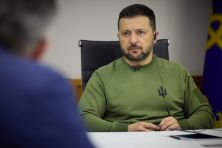The amount of disinformation online is growing rapidly with fake political news starting to outnumber stories based on facts, according to a report by the Digital, Culture, Media and Sport Committee of the British Parliament.
The ability to discern real news from the fake is increasingly important. To aid in this effort, a school on media literacy has been created in Ukraine.
Youtube is rife with Russian propaganda.
In one of the latest versions, they spin a story about a former Kyiv parking attendant, and now a pro-Russian militant who goes by the callsign “Baikonur.” He claims that he was beaten up in Kyiv during the pro-European protests in 2014 for saying that his last name was Putin.
“They put me in a car, blindfolded me. And said that I have to be identified, that I have to introduce myself, in case they captured the wrong person. I said my last name was Putin. They started beating me and shouting that they captured Putin,” the man claims.
But how do you tell a fake social media accounts from real ones and authentic photos from photoshopped masterpieces? How can you tell if a comment under a piece of news was written by trolls? These are the main topics of discussion at this media literacy workshop in Kyiv. High-schooler Daria Kripki-Kasado is one of the students
“Any modern profession requires having a high level of media literacy, knowing the basics of journalism, being an independent PR manager and a bit of a writer,” Kripki-Kasado said.
“Today, it is necessary to be able to filter the truth from the lies. It’s important to be able to tell if a certain channel or a source of information can be trusted. I think that it’s impossible to build an objective vision of the world without this,” First Deputy Minister of Information Policy of Ukraine Emine Dzheppar said.
Professional journalists, cameramen, directors, and presenters are teaching high school and university students the basic skills for working in the media sphere.
“We will try to help them create content. Our main task – creating high-quality content which will run through all the ten classes. It can be video content, text or photos,” Media Coach of the Ukrmedia NGO Oleh Cheslavskyi said.
After completing the course, the most accomplished students will get an opportunity to undergo an internship at UATV.













